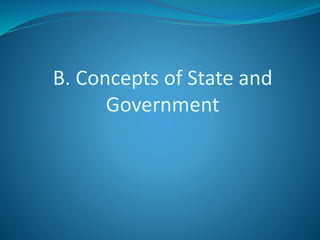
Concepts of State, Government and Philippine Political Systems
- 1. B. Concepts of State and Government
- 2. Meaning of State A state is a community of persons more or less numerous, permanently occupying a definite portion of territory, having a government of their own to which the great body of inhabitants render obedience, and enjoying freedom from external control. The Philippines is a state.
- 3. Elements of a state 1. People - The mass of the population living within the state.
- 4. “people” answers the question, “who governs whom?” no specific number requirement “…the state shall neither be too small nor yet one that seems great but has no unity.” (Plato)
- 5. Elements of a state 2. Territory - demarcated area that rightly belongs to the population
- 6. “territory” answers the question, “where?” terrestrial, fluvial, maritime and aerial should be permanent and large enough to be self-sufficing
- 7. Elements of a state 3. Government - Refers to the agency to which the will of the state is formulated, expressed, and carried out.
- 8. Elements of a state 4. Sovereignty - May be defined as the supreme power of the state to command and enforce obedience to its will from the people within its jurisdiction and corollarily to have freedom from foreign control.
- 9. “sovereignty” a. Internal – power of the state to rule within its territory b. External – the freedom of the state to carry out its activities without subjection to or control by other states.
- 10. Origin of states 1. Divine right theory 2. Necessity or force theory 3. Paternalistic theory 4. Social contract theory
- 11. State distinguished from nation “The state is a political concept while a nation is an ethnic concept.”
- 12. State distinguished from nation “ A state is not subject to external control while a nation may or may not be independent of external control.”
- 13. State distinguished from nation “ A single state may consist of one or more nations or people and conversely, a single nation may be made up of several states.”
- 14. State distinguished from government “…they are usually regarded as identical. As ordinarily, the acts of the government are the acts of the state.”
- 15. State distinguished from government “A state cannot exist without a government, but it is possible to have a government without a state.”
- 16. State distinguished from government “A government may change, its form may change, but the state, as long as its essential elements are present, remains the same.”
- 18. “forms” of government refer to the basic rules by which a nation carries out its policies there is no standard for the classification of governments actual arrangements differ from theoretical ones
- 19. governments: Aristotelian typology Number of rulers Ideal Perverted One Few Many Monarchy Aristocracy Democracy Tyranny Oligarchy Mobocracy
- 20. As to extent of powers exercised by the central or national government a. Unitary - control of national and local affairs is exercised by the central or national government b. Federal –powers of the government are divided between to sets of organs, one of the national and the other for local affairs
- 21. As to the relationship of the between the executive and the legislative branches of the government a. Parliamentary – legislative and executive bodies are fused together b. Presidential – the executive is constitutionally independent of the legislature
- 22. C. The Government of the Philippines in Transition
- 23. The pre-Spanish government (1)Unit of government composed of settlement villages called barangay from balangay a Malayan word meaning boat
- 24. every barangay was virtually a state they form confederations for the purpose of protection against common enemies
- 25. Balangay
- 26. The pre-Spanish government (2)Datu each barangay was ruled by a datu the barangay is monarchy in form, with datu as its monarch
- 27. The pre-Spanish government (3) Social Classes in the barangay the people of the barangay are divided into four classes namely: o the nobility (maharlika) o the freemen (timawa) o serfs (aliping namamahay) o slaves (aliping sagigilid)
- 28. Timawa Maharlika
- 29. Alipin
- 30. The pre-Spanish government (4) Early laws Maragtas Code – written by Datu Sumakwel about 1250 AD Kalantiaw Code – written by Datu Kalantiaw in 1433 AD
- 31. The pre-Spanish government (5) Comparison with other ancient governments laws of barangay are generally fair the system of government although defective was not so bad Filipinos even during the early period have shown high intelligence and moral virtues
- 32. Government during the Spanish period Spain’s title to the Philippines o discovery of the archipelago Magellan 1521 o Conquest of Miguel Lopez de Legazpi in 1565 o By virtue of the Treaty of Paris, the Philippines was ceded to the United States
- 33. Government during the Spanish period Spanish colonial government othe Philippines was ruled indirectly by the King of Spain through Mexico from 1565 to 1821 oMexico obtained its independence from Spain, thus, the Philippines was ruled directly from Spain until 1898
